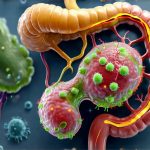The intricate world within our digestive system is far more complex than simply breaking down food. It’s an ecosystem teeming with trillions of microorganisms—our gut microbiota—that profoundly influence not just digestion but also immunity, mental well-being, and even chronic disease risk. For decades, research focused largely on the food we consume, but increasingly, scientists are recognizing that what we drink, specifically the quality of water and its mineral composition, plays a surprisingly significant role in shaping this internal landscape. The gut microbiota isn’t static; it’s a dynamic community constantly responding to environmental factors, and water is arguably one of the most pervasive environments within our bodies.
The often-overlooked aspect of hydration extends beyond simply preventing dehydration. Water acts as a solvent, transporting nutrients and removing waste products. More importantly for this discussion, it directly impacts the physical environment in which gut bacteria thrive. The osmotic pressure, pH levels, and availability of essential minerals – all influenced by water quality – are critical determinants of bacterial diversity and function. A disruption to these factors can lead to dysbiosis—an imbalance in gut flora—potentially triggering digestive issues, compromised immunity, and a cascade of related health problems. Understanding the connection between our hydration sources and gut health is therefore crucial for supporting overall wellness. You may find more information about how common medications affect gut health here.
The Impact of Water Quality on Gut Microbiota Composition
Water isn’t chemically inert; it carries with it dissolved substances that can directly influence the microbial ecosystem in our gut. – Chlorine, a common disinfectant used in municipal water supplies, while effective at killing harmful pathogens, doesn’t discriminate between “good” and “bad” bacteria. Prolonged exposure to chlorinated water may disrupt the delicate balance of gut flora, reducing beneficial bacterial populations and potentially promoting the growth of more resilient, opportunistic species. – Fluoride, another additive frequently found in public water systems, has also been shown to have effects on microbial communities, though the research is still evolving. Some studies suggest fluoride can alter bacterial metabolism and even contribute to antibiotic resistance within the gut. – Heavy metals like lead and mercury, contaminants that can leach into water sources from industrial pollution or aging pipes, are unequivocally detrimental to gut health and overall well-being. These toxins accumulate in the body over time, disrupting microbial balance and impairing digestive function.
Beyond additives and contaminants, the source of our water also matters. Bottled water, while often perceived as “pure,” can vary significantly in mineral content depending on the spring or aquifer it originates from. Some bottled waters are highly purified with reverse osmosis, stripping away almost all minerals, resulting in a very low mineral density which may not optimally support microbial diversity. Conversely, well water can contain naturally occurring minerals and potentially higher levels of contaminants depending on geological conditions and surrounding land use. The pH level of water is also important; highly acidic or alkaline water can disrupt the gut environment and affect bacterial growth. Maintaining a slightly alkaline internal environment generally supports a healthier gut microbiome. Understanding fermentable sugars impact on gas production https://vitagastro.com/the-effect-of-fermentable-sugars-on-gut-gas-production/ can also help with overall digestive health.
The effects aren’t always negative, however. Mineral-rich waters, particularly those containing magnesium, calcium, and sulfate, have been linked to positive changes in gut microbiota composition. These minerals are essential for microbial metabolism and can promote the growth of beneficial bacteria like Bifidobacteria and Lactobacilli, known for their role in maintaining digestive health and boosting immunity. The key lies in finding a balance – avoiding excessive contamination while ensuring adequate mineral content.
Mineral Balance and Digestive Function
The gut isn’t just home to bacteria; it’s also responsible for absorbing the nutrients we need to thrive. This absorption process is heavily reliant on mineral balance, which is directly influenced by the water we drink. – Magnesium plays a crucial role in muscle contraction (including peristalsis – the wave-like movements that move food through the digestive tract), enzyme function, and nerve transmission—all essential for efficient digestion. Deficiencies can lead to constipation, bloating, and impaired nutrient absorption. – Calcium isn’t just for bones; it’s involved in activating digestive enzymes and maintaining the integrity of the intestinal lining. Insufficient calcium intake can compromise these functions and contribute to leaky gut syndrome, where undigested food particles and toxins leak into the bloodstream. – Sulfate is essential for bile acid production, which emulsifies fats, making them easier to digest and absorb. A lack of sulfate can lead to fat malabsorption and associated digestive discomfort.
The bioavailability of minerals – how easily our bodies can absorb and utilize them—is also affected by water quality. Water with a higher pH generally enhances mineral absorption, while acidic water can hinder it. Furthermore, the presence of other compounds in water, such as tannins found in some natural springs, can bind to minerals and reduce their bioavailability. Therefore, simply drinking enough water isn’t always sufficient; we need to consider the quality and mineral composition to maximize digestive function. If you experience discomfort at high altitudes https://vitagastro.com/the-effect-of-high-altitudes-on-gas-and-bloating/, hydration is even more critical.
Hydration Strategies for a Healthy Gut
Optimizing gut health through hydration involves more than just reaching the recommended daily intake of water. It’s about making informed choices about our water sources and incorporating strategies to support microbial balance. Consider these steps: – Filter your water: A high-quality water filter can remove chlorine, fluoride, heavy metals, and other contaminants from tap water. Look for filters certified to reduce a wide range of pollutants. – Explore mineralized water options: If you prefer bottled water, choose brands with naturally occurring minerals or consider adding a pinch of Himalayan pink salt (which contains trace minerals) to your filtered water. – Consider structured water: While still under investigation, some research suggests that “structured” or hexagonal water may have enhanced hydration properties and improved cellular absorption.
Beyond the type of water we drink, how we hydrate also matters. Sipping water throughout the day is preferable to gulping large amounts at once, as it allows for better absorption and minimizes strain on the digestive system. Avoiding sugary drinks and excessive caffeine consumption is vital; these can disrupt gut flora and impair hydration. Focusing on whole, unprocessed foods with high water content—such as fruits and vegetables—can further contribute to optimal hydration and gut health. Finally, paying attention to your body’s signals of thirst and responding accordingly is paramount. Understanding the impact alcohol and caffeine has https://vitagastro.com/the-impact-of-alcohol-and-caffeine-on-digestion/ is also important for overall digestive health.
The Role of Electrolytes in Gut Function
Electrolytes – sodium, potassium, chloride, magnesium, and calcium – are minerals that carry an electric charge when dissolved in water. They’re essential for maintaining fluid balance, nerve function, and muscle contractions—all vital for digestive processes. – Sodium plays a crucial role in absorbing nutrients from the small intestine. However, excessive sodium intake can disrupt gut microbiota composition and potentially increase inflammation. – Potassium helps regulate fluid balance and supports healthy bowel movements. Deficiencies can lead to constipation and bloating. – Chloride is essential for producing stomach acid, which breaks down food and activates digestive enzymes.
Electrolyte imbalances can significantly impact gut function. Dehydration, strenuous exercise, and certain medical conditions can all disrupt electrolyte levels. Replenishing electrolytes through water with added electrolytes (or naturally occurring electrolytes in mineral-rich water) can help restore balance and support optimal digestion. However, it’s important to avoid excessive electrolyte supplementation, as this can also have adverse effects. A balanced diet rich in fruits, vegetables, and whole grains provides a natural source of electrolytes without the risk of overconsumption. The gut microbiome itself plays a role in regulating electrolyte absorption; certain bacteria help facilitate the uptake of sodium and potassium, further highlighting the interconnectedness between hydration, mineral balance, and microbial health. If you are experiencing issues with gut microbiome balance, https://vitagastro.com/gerd-and-the-role-of-gut-microbiome-balance/ it’s important to seek guidance. Additionally, the effects of aging https://vitagastro.com/the-effect-of-aging-on-the-digestive-system-and-gerd/ can significantly impact digestive function, making proper hydration even more crucial. Finally, the impact of cold beverages https://vitagastro.com/the-impact-of-cold-beverages-on-gut-function-and-bloating/ should be considered as well.


















